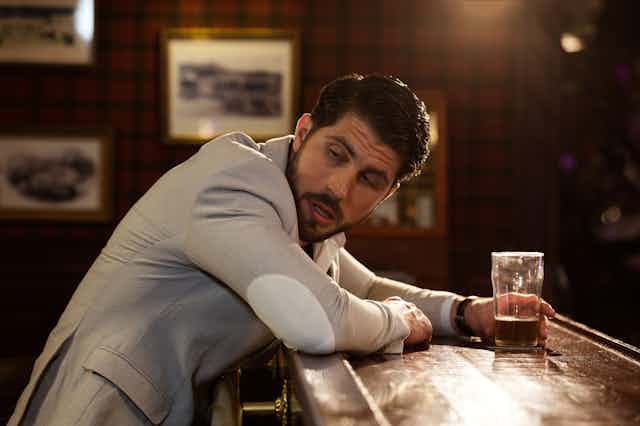Alcohol makes us happy via the release of dopamine and endorphin hormones. These hormones are responsible for the merry feeling we get while drinking. Alcoholic people get addicted to this feeling and become dependent on booze. Alcohol is a depressant that can react negatively with the brain, making one sadder. Although you might speak more freely while drunk, it’s not necessarily the case that your true feelings come out.
Alcohol is a great substance that should be enjoyed responsibly and in moderation. Sometimes called the great ice-breaker, it tends to dissolve the awkward tension in the air in social situations.
But how does it do it? How does alcohol make you happy? And can it make you sad as well?
In this article, we answer the questions above and many more, diving deep into how alcohol works on the brain.
Table of Contents
ToggleWhy Does Alcohol Make You Happy?

Alcohol stimulates neurons and cells that produce endorphins and dopamine. These hormones are responsible for the feeling of happiness. Alcohol is also a potent numbing substance that can create a pleasant sensation throughout your body.
Alcohol in itself is a chemical compound that has largely negative effects when you think about it. Wobbly movement, weakened memory, and dehydration are all caused by excessive alcohol drinking. However, in moderation, it can be considered beneficial in social situations.
Drinking alcohol causes the release of “happiness” hormones called dopamine and endorphin in larger amounts than usual. These hormones are the ones that make drinkers merry and quick to laugh in social situations.
It’s important to note that although this might sound fun, there is a time, place, and amount for everything. Excessive alcohol drinking is extremely unhealthy and leads to health issues, including liver diseases, heart failure, and depression.
Can Alcohol Make You Sad?

Alcohol can make certain people feel down when consumed. This is especially true the day after when you are deficient in the hormones causing happiness.
As a drug, alcohol is a depressant, meaning it slows down your perception as opposed to something like caffeine, which makes you more alert. While some people might enjoy this feeling, others may become annoyed, anxious, paranoid, or even depressed.
The day after a night out, you might become hungover as well. This is mainly due to dehydration (the main reason your head hurts) but also due to a deficiency in dopamine and endorphin. Alcohol acts quickly and causes the release of high amounts of happiness hormones in a short time, meaning that the next day, one might experience feeling down due to the lack of these hormones.
It is important that everyone knows how they react to certain substances and what their boundaries are. If you feel like alcohol has a negative effect on you, there is absolutely nothing wrong with steering clear of it and enjoying social situations sober.
Do Your True Feelings Come Out When You’re Drunk?
While alcohol may make you speak more freely, it is not true that your true feelings come out. Your thoughts while drunk may become exaggerated, and you are more than likely to look back at them the day after as things that should’ve been left unsaid.
Alcohol, in essence, is a drug, and as a drug, it has ways to alter your perception, thoughts, and feelings. The saying that being drunk brings out your true feelings can be true, but only partially.
Drinking does remove your inhibitions to an extent, but your feelings become exaggerated as well, meaning that you cannot really express how you really feel. It is often the case that the day after, you look back on the things you said and did and feel shame and awkwardness.
Being drunk does not absolve you of your responsibilities. You should always be careful what you do or say under the influence to avoid hurting others and yourself, both physically and emotionally. The best way to avoid situations like this is to drink only in moderation and know your and others’ boundaries.
How Does Someone Become Alcoholic?
People with alcohol use disorder become dependent on the substance over time, as the feeling while drinking alcohol is pleasurable. There are other reasons for developing AUD, which can change from person to person, but the main one is escapism.
Alcoholics, or people with alcohol use disorder (AUD) are people who are physically and emotionally dependent on alcohol. They develop their addiction by drinking more and more as they chase the feeling that alcohol causes by helping the rapid release of endorphins and dopamine. As they drink more, they become more and more resistant to the effects of alcohol, creating a vicious cycle where they need exponentially more alcohol each time to get that feeling.
A common reason people might turn to the bottle is escapism. Someone who went through a traumatic event or felt like they are useless and life is meaningless might start to drink alcohol as they feel that is the only time they feel happy and do not think about stressful situations.
It’s important to know that alcohol is never the answer and is just another problem added to the pile. If you or someone you know is dependent on alcohol, there are many great communities and support groups that are always ready to help. Every people who recovered from AUD should be a staunch reminder that there is always light at the end of the tunnel.
Conclusion
Alcohol makes you happy as it causes the rapid release of endorphins and dopamine, which are hormones responsible for happiness. It can also make you sad, as it is a depressant and causes you to be more numb. It’s important to know your boundaries and how you react to alcohol to make an educated decision.
Although alcohol can make you feel more free, it skews your perception, and your feelings become exaggerated. AUD is caused by becoming dependent on the feeling while drinking and needing more and more alcohol to achieve that. Alcohol is never the answer to anyone’s problems and reaching out for help is always the best option.

I am a passionate beer connoisseur with a deep appreciation for the art and science of brewing. With years of experience tasting and evaluating various beers, I love to share my opinions and insights with others and I am always eager to engage in lively discussions about my favorite beverage.
















